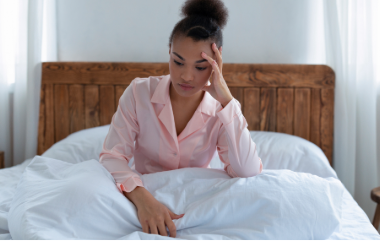
Psychological well being and sleep are deeply linked. New information present simply what number of People are struggling. A latest survey by the American Academy of Sleep Drugs reveals that stress, nervousness, and despair are main sleep disruptors for almost all of U.S. adults.
Stress and nervousness disrupt sleep for many
In response to the survey, 74% of Americans report generally, all the time, or usually experiencing disrupted sleep as a consequence of stress. Nervousness can be a significant factor, with 68% reporting they lose sleep due to it.
“Stress and nervousness can considerably disrupt sleep patterns by triggering the physique’s fight-or-flight response, making it tough to chill out,” mentioned Jennifer Martin, a licensed medical psychologist and previous president of the AASM. “When the thoughts is racing with worries, it turns into practically unimaginable to realize the deep, restorative sleep we’d like for total well being.”
Despair provides to sleep challenges
Despair is one other frequent reason behind disrupted sleep. More than half of adults (55%) within the survey reported sleep points as a consequence of despair.
Dr. Martin defined that psychological well being and sleep usually have an effect on one another in a cycle.
“Many People discover themselves caught in a loop: Psychological well being circumstances disrupt their sleep, and poor sleep worsens their psychological well being circumstances,” Dr. Martin mentioned. “This cycle can result in a spread of well being points, past simply daytime sleepiness. Inadequate sleep can impair cognitive operate, have an effect on temper, and diminish total high quality of life.”
Tricks to sleep higher with stress and nervousness
To assist break the cycle, the AASM recommends a number of methods:
- Create a relaxing sleep area: Maintain your bed room cool, darkish and quiet.
- Apply rest strategies: Strive meditation, deep respiration or journaling earlier than mattress.
- Restrict caffeine and alcohol: In the reduction of on caffeine and alcohol, particularly within the hours main as much as bedtime.
- Get transferring: Common train improves temper and helps scale back stress. Attempt to keep away from vigorous train near bedtime.
- Watch your eating regimen: Keep away from massive meals late at night time; go for a light-weight snack if wanted.
- Get assist: If stress and nervousness proceed to disrupt your sleep, contemplate speaking to a therapist or counselor who can present coping methods and assist.
“Addressing these intertwined challenges requires a holistic strategy, focusing not solely on enhancing sleep but additionally on managing stress and emotional well-being,” Dr. Martin mentioned.
Assist is offered
If stress, nervousness, or despair are affecting your sleep, don’t wait to get assist. Anybody who has a sleep drawback can use the AASM’s sleep center directory to get assist from the sleep workforce at an accredited sleep heart.
Associated:
Trending Merchandise

